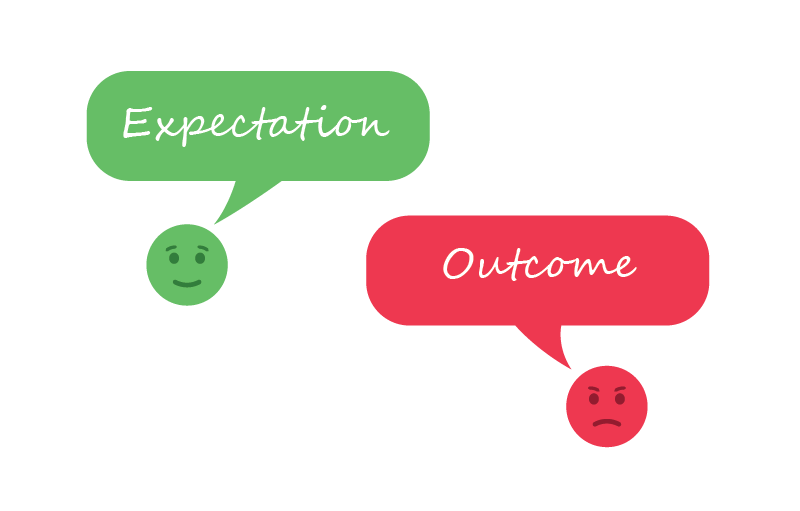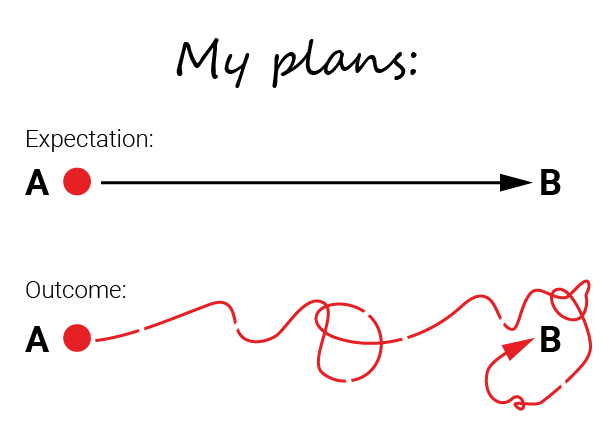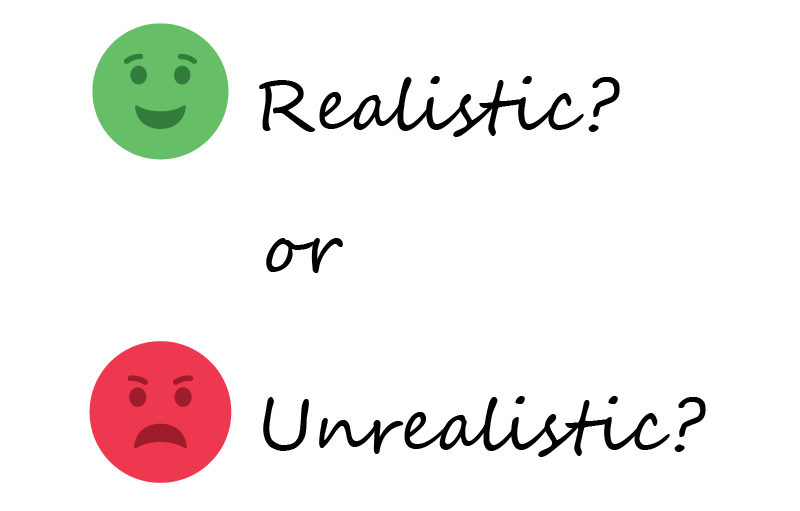Expectations are a normal part of being human, but we can't always control the outcomes.
“Expectations are premeditated resentments.”
Premeditated means to think out or plan (an action, especially a crime) beforehand. This popular saying is used to explain how starting with unrealistic expectations can lead to disappointment.
The Psychology of Expectations
Simply expecting something to happen doesn’t mean it will happen. This is called magical thinking.
Humans have the tendency to tie their hopes for happiness on expectations that are fulfilled.
 Photo by Dollar Gill on Unsplash
Photo by Dollar Gill on UnsplashSo how can we minimize these negative feelings, while staying positive and realistic?
Acknowledge Your Feelings
 Successful outcomes based on our expectations give us feelings of happiness. Unsuccessful outcomes can lead to feelings of disappointment and resentment.
Successful outcomes based on our expectations give us feelings of happiness. Unsuccessful outcomes can lead to feelings of disappointment and resentment.
How we feel about the outcome of the expectation is important.
Consider This
Online shopping is a good way to measure our expectations. How many times have you bought a product or clothing expecting a certain quality or fit? Did you get what you wanted?
 Photo by Sergey Zolkin on Unsplash
Photo by Sergey Zolkin on UnsplashSuccessful: the item you received was perfect. You are happy with the outcome. You leave a good review.
OR
Unsuccessful: the item you received was defective, didn't fit, or just not what you wanted. You're disappointed. You deal with your disappointment by leaving a bad review.
Takeaway: Accept how you feel in any given situation when expectations are not fulfilled.
Quiz
Which one of these is a successful outcome?
Communicating Expectations
 When we expect something of other people, we need to communicate our expectations if we want them to be met. After all, we can't read each other's minds.
When we expect something of other people, we need to communicate our expectations if we want them to be met. After all, we can't read each other's minds.
When we don't communicate our expectations to others, we can end up feeling disappointed, offended, or resentful.
Consider This
One morning, Sarah's partner Ben makes her coffee.
The next morning, Sarah wakes up expecting coffee, but Ben didn't make any. She's disappointed but doesn't say anything.
That week, each morning, Sarah is disappointed when she sees Ben hasn't made coffee. She gets annoyed and feels let down.
 Photo by Joshua Ness on Unsplash
Photo by Joshua Ness on UnsplashThis a classic example of miscommunication. Sarah had an expectation of Ben that she didn't share with him. The result? A kind action becomes a source of bad feelings.
Takeaway: Voice your expectations out loud to increase the chance that others will meet them.
Quiz
Communicating your expectations prevents feelings of happiness.
Avoid Assumptions
 Assumptions are things we accept as true or as certain to happen, without proof. Assumptions can lead to unrealistic expectations.
Assumptions are things we accept as true or as certain to happen, without proof. Assumptions can lead to unrealistic expectations.
Consider This
One day, Joe tells his son Ari to mow the lawn after school.
Ari doesn’t like mowing the lawn and is busy with after school activities.
Later, Joe finds out that the lawn is not mowed and gets angry at Ari for not doing the task when he asked them to.
 Photo by Andres Siimon on Unsplash
Photo by Andres Siimon on UnsplashJoe communicated his expectation, but assumed that Ari would meet it without getting confirmation.
Takeaway: When you communicate an expectation, get confirmation from the other person. They may have their own expectations that need to be addressed.
Quiz
Was Joe's expectations realistic or not realistic?
Be Flexible
We can't help how we feel.
It's not easy being flexible when it comes to emotions. Emotions are not something we can turn off and on like a light switch.
Consider This
You have plans to get from point A to point B. You expect it to be a simple trip.
But you have stopped 4 times. Then had to take an alternative route, and got lost twice before you got to your destination at point B.
At the end of the trip you are angry, tired, and frustrated.
 The expectation did not match the outcome.
The expectation did not match the outcome.
Set expectations that are realistic.
We want our expectations to be fulfilled exactly as we imagine - without issues or complications. But often, we may run into challenges we don't expect.
Takeaway: Remember that expecting something to happen doesn't mean it will happen, and that there is more than one way to reach a successful outcome.
Take Action
Ask yourself:
Is my expectation unrealistic or realistic?
Will the outcome make me happy or unhappy?
And Remember:
Don't set your expectations too low. It's ok to feel disappointed or resentful sometimes. The key is accepting when the outcome isn't what you were hoping for, and letting go of those emotions in a healthy way.

Your feedback matters to us.
This Byte helped me better understand the topic.
